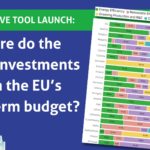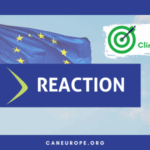 On November 26-27, the European Commission for Development Cooperation (DEVCO) held its annual European Development Days, an international forum aimed to address international affairs and development.
On November 26-27, the European Commission for Development Cooperation (DEVCO) held its annual European Development Days, an international forum aimed to address international affairs and development.
A panel discussion on climate change and poverty eradication set the scene for what lies ahead in tackling climate change as a means to ensuring truly sustainable and inclusive development. The forum came just after another UNFCCC COP, where outcomes were too meager to really tackle climate change. This lack of ambition and will to act directly impacts the effort to effectively reduce poverty in all regions and secure a decent standard of living for people all over Europe and across the world.
The frequency and nature of climate related devastation now happening in both developing and developed countries is clear evidence of the threat posed by climate change to all aspects of sustainable development – the right to food, water and sanitation, protection of biodiversity and ecosystems to name just a few.
Climate change as a development challenge is not a new phenomenon and this panel discussion illustrated that quite well. UN officials and Connie Hedegaard, the EU Commissioner for Climate Action, pointed out the need align these issues more closely. But despite these assertions, making the link between the EU’s domestic climate ambition and how it impacts the international efforts to achieve sustainable development is something that has not been sufficiently touched upon. Highlighting the EU’s responsibility to tackle carbon emissions and the exploitation of dirty energy comes back to the principle of universality, or how goals should be universally applicable to all countries and regions. This should also highlight whether the EU is genuinely playing its part in making sustainable and inclusive development a reality.
CAN Europe sees the post-2015 framework as a crucial phase for the EU’s adoption of a universal approach that aligns climate change and development, one where the EU’s goals to spearhead inclusive sustainable development are met through its domestic climate ambition. This alignment would mean going beyond the EU’s usual approach to development simply by providing external assistance. In addition, the EU should help tackle poverty by increasing its climate ambition through legal commitments under the UNFCCC. This would directly translate as an increase in greenhouse gas reduction targets, the amount of renewables in its final energy mix and the level of energy efficiency across the EU.
We emphasise that the post-2015 framework should not overtake the role of the UNFCCC in the realm of tackling climate change, but the EU should recognize the interdependence between the two processes for achieving a decent standard of living for all. Tackling climate change through strong domestic policies will be essential to a framework where the EU has equal responsibility for action that results in universally applicable sustainable development goals.
Photo credit: EU DEV/FAO/FLICKR



